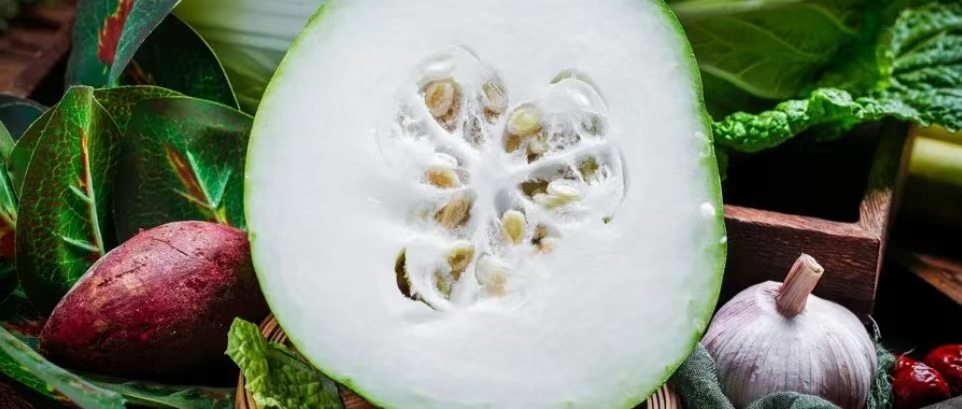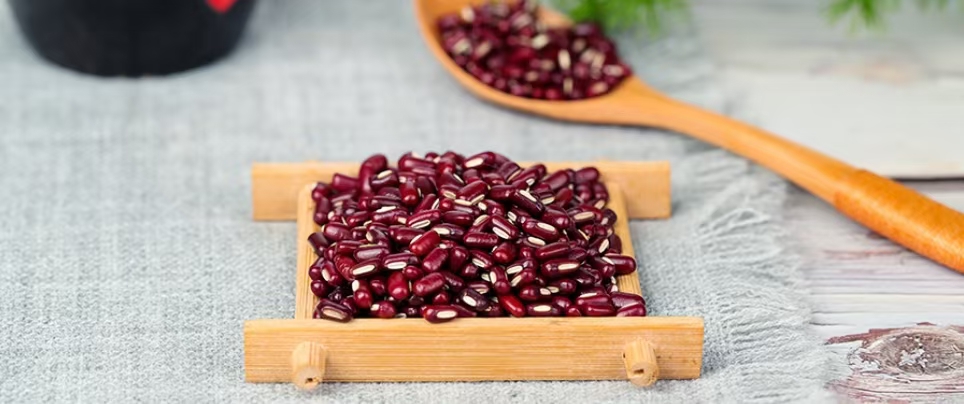Five Foods That Help You Lose Weight in Traditional Chinese Medicine
Five Foods That Help You Lose Weight in Traditional Chinese Medicine
Many people want to maintain a slim figure, but losing weight is an art. It's not just about "dieting + exercise." If not done properly, it can harm your vital energy and weaken the functions of your internal organs!
In fact, the process of losing weight is about "eliminating the old and bringing in the new." Traditional Chinese Medicine (TCM) believes that overweight individuals tend to have excess phlegm, dampness, and deficiency. The process of weight loss involves expelling excess phlegm and dampness from the body, strengthening the spleen and stomach, replenishing qi and blood, and cutting off the sources of phlegm and dampness. Eventually, fat is reduced, and muscle is built!
You'll find that with this approach, your muscles become firm, you're less likely to regain weight, and you'll be full of energy and vitality. Some minor health issues might even improve along the way. Today, let's introduce five foods that TCM views as helping you lose weight the more you eat them. They cleanse and nourish, and the last one might surprise you!

1. Winter Melon: The First Slimming Melon of Summer
Winter melon is widely recognized in the food therapy world as the "slimming melon." According to Compendium of Materia Medica, "If you wish to be slim and light, you should consume it regularly; if you wish to gain weight, avoid it."
Don't underestimate winter melon; it’s quite powerful. Modern people often gain weight due to overeating, lack of exercise, spleen deficiency, and qi and blood deficiency, leading to the accumulation of phlegm and dampness, which turns into fat. Winter melon helps dissolve phlegm and expel damp-heat and phlegm turbidity through urine.
The Chinese Materia Medica records that it "promotes urination; clears heat; dissolves phlegm; generates fluids; detoxifies." Modern medicine finds that winter melon is fat-free, rich in propanedioic acid, cucurbitacin, and vitamin B1, which can effectively prevent the conversion of carbohydrates into fat and prevent the accumulation of body fat, while also helping to burn off excess fat. This explains why winter melon is commonly found in weight loss diets!
To maximize its effects, don't peel or remove the seeds! The skin and seeds of winter melon are the most effective parts for promoting urination and dissolving phlegm, so removing them would be a waste. Simply wash the skin, cut the melon into large pieces, and boil them in water. For those with weak and cold stomachs, add a few slices of ginger to balance the cooling nature of winter melon. You can also use it to make porridge or soup, which is perfect for summer!
2. Poria: Extracting Fat and Dampness from the Body
Poria, known as the "God Herb of Four Seasons," is formed by the resin of pine trees deep underground, absorbing the essence of pine over a thousand years. Its most notable function is to "strengthen the spleen, drain dampness, and promote urination."
"Draining dampness" is akin to squeezing water out of a wet towel with a heavy stone on top. The spleen likes dryness and dislikes dampness, and Poria helps drain the dampness from the spleen and stomach, allowing the spleen to function normally and thus strengthening it. Almost all spleen-strengthening prescriptions in TCM contain Poria.
Renowned physician Zhang Xichun praised it highly:
Simply put, Poria can turn phlegm in the stomach into liquid, which is then excreted through urine. At the same time, it nourishes the spleen, stomach, lungs, and heart. When the spleen and stomach are healthy, the ability to expel dampness naturally increases. When the lungs recover, they can better metabolize fluids.
Poria is like a natural "cleanser" that can scrape away the phlegm and dampness in the body, leaving it refreshed. It also calms the mind, making it especially suitable for those overwhelmed with desires and distractions to purify both body and mind. More importantly, it doesn’t harm yin or vital energy, so it can be consumed long-term!

3. Coix Seed + Adzuki Beans: Ideal for Those with Lower Body Fat
Many people have heard of Coix Seed and Adzuki Bean water, which is a popular fat-reducing drink in TCM. In TCM, these two herbs are often used together as they complement each other perfectly.
Coix Seed and Adzuki Beans have a sweet and bland taste, and they are dense, hard, and water-insoluble. This characteristic makes them effective in promoting urination and reducing swelling.
As water flows downward, dampness also tends to accumulate in the lower body. Coix Seed and Adzuki Beans are particularly effective in eliminating dampness in the lower body, making them ideal for those with lower body fat or prone to swelling.
However, Coix Seed can be a bit cooling, so those with weak and cold spleens should roast them before consumption. It's best to pair them with spleen-strengthening foods such as yam, gorgon fruit, and lotus seeds.

4. Lotus Leaf: Activating the Spleen and Accelerating Fat Breakdown
The green and aromatic lotus leaf, supported by a single stem, stands out from the water with a strong uplifting force. TCM believes that this force can ascend the clear and descend the turbid!
In simple terms, lotus leaf can activate the qi of the spleen and stomach, helping the spleen's clear qi to rise and the stomach's turbid qi to descend. When spleen qi ascends, nutrients can be supplied to the heart, lungs, and head. When stomach qi descends, it aids in digestion, absorption, and excretion.
Many people today are overweight due to metabolic issues, often related to blockages in the middle burner (middle part of the body). Lotus leaf helps activate the spleen and stomach, making it especially suitable for those with chronic spleen deficiency, bloating, and poor digestion.
The Essentials of Diagnosis and Treatment states: "Lotus leaf can make one lean and eliminate edema when consumed alone." Modern medicine has discovered that the alkaloids in lotus leaf form a fat-blocking layer in the intestinal wall, preventing fat absorption. Lotus leaf also contains various lipid-dissolving alkaloids that help break down body fat. It also has a strong fat-repelling effect, gradually making you dislike greasy foods!
5. Astragalus: Strengthening Spleen and Lung Qi, Essential for People with Deficiency and Obesity
Obesity can be classified as "solid" or "deficient" in TCM. Some people are solidly obese: they eat well, exercise little, have a robust build, good appetite, sound sleep, and good energy. This type of obesity requires a regimen of diet control, exercise, and phlegm-dampness elimination.
However, extreme dieting and excessive exercise should be avoided, as it may turn a robust person into someone with a weakened spleen and qi deficiency! It's recommended to aim for a weight loss of 0.5 to 1 kg per week, or 1 to 3 kg per month, for gradual and sustainable results.
Modern people are more often deficiently obese: they don't eat much or drink alcohol, yet they accumulate more fat, particularly around the waist, thighs, and buttocks. The fat feels soft and lacks strength, and they become easily short of breath, sweating profusely even after slight exertion, despite their young age.
For those with deficient obesity, simply dieting and exercising might result in a smaller face and chest but won't effectively reduce the areas that need it most! When eliminating dampness and phlegm, it’s crucial not to forget to replenish qi, with Astragalus being the top choice.
According to Materia Medica for Factual Use: "Astragalus is the best among all qi-tonifying herbs."
Astragalus enters the spleen and lung meridians, supplementing the qi of both organs. When spleen qi is strong, it helps expel dampness. When lung qi is sufficient, it enhances the transportation and distribution of fluids, thereby improving the metabolism of dampness, phlegm, and other bodily waste.
Famous physician Zhang Xichun stated in A Compendium of Medicine with Western TCM Integration: "Astragalus can replenish qi and elevate it, effectively treating the sinking of qi in the chest... It is the best tonic, especially for supplementing qi."
Qi naturally has an uplifting effect, and when it is sufficiently replenished, you won't experience issues like a shrinking chest, dizziness, fatigue, menstrual problems, or frequent illness during weight loss. With adequate qi and blood, your skin will also be nourished, appearing bright and radiant rather than sallow and dull as often happens during weight loss.
If you're extremely deficient, severely congested, and dealing with a lot of stress, resulting in a vicious cycle of getting fatter as you get more exhausted, consider supplementing with ginseng to quickly boost your vital energy.
Ginseng rapidly replenishes qi, strengthens the function of internal organs, enhances basal metabolism, and generates fluids without causing dryness or heat. It also calms the mind, ensuring a good night's sleep and providing ample energy and vitality during the day. Paired with dried tangerine peel, it helps regulate the spleen and stomach, expel dampness and phlegm, and get your middle burner functioning properly. This way, you can nourish without stagnation and tonify without causing heat.
By clearing away dampness and phlegm, replenishing qi, and nourishing the spleen and stomach, slimming down becomes more achievable.